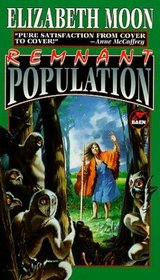Helpful Score: 1
Very different first contact story, as the human is an older(70+) woman, who illicitly chose to stay behind after her colony was removed from their planet. Her personal transformation due to solo living and subsequent interaction with the previously undiscovered intelligent natives is intriguing and the alien culture is well developed.
I enjoyed this book tremendously! Very good story and good characters.
This book creeps up on you. I first felt Ofelia was an idiot. Slowly, you realize that she is a product of her culture. And then I was very sad when the book ended. It was excellent, complex and actually makes you think.
Great story. For fans of feminist science fiction such as by Sheri Tepper and Pamela Sargent.
This book was refreshingly different. There were no huge battles against Bad humans or aliens with the good guys winning at the end by some sneaky, low chance means. It is a book that champions the idea that you are "never to old to...'. This book might make you look at Grandma, your Mom or maybe even yourself a little differently. It is about starting over and figuring out what needs to be done when you don't know the right answer.
Very disappointing. Great premise, heroine with terrific potential, but after a promising opening, Moon doesn't know where to go with it.
Some spoilers below, but these are only details that are revealed in the cover blurb and summary ...
I think this would have made a good novella -- stretching it out to full novel length just doesn't work, as the challenges that Ofelia faces (either before or after she encounters the native species) just aren't that interesting. It's all too easy: unlike Robinson Caruso, who had to build his survival strategy on his desert island from the ground up, Ofelia inherits a fully functioning colony town, where goods and equipment have conveniently been left for her to take over and, conveniently, she remembers pretty well how to handle it all. The native aliens -- who have slaughtered a group of new colonists -- offer no real threat to her. The company representatives are cardboard cut-out villains, and pretty dumb with it (which is hardly surprising when you think that this is the Company that twice missed all signs of a native species with enough technology to slaughter a group of colonist upon arrival ... Good work, guys!!)
Moon is no Ursula Le Guin. (I would cheerfully give my right arm to see what Le Guin would have done with this.) That's my shorthand for the fact that's Moon is no stylist, that after the initial novelty of Ofelia as protagonist, and her (could have been) interesting situation, the writing is clunky and repetitive. But Moon is no anthropologist either, and the aliens, the People, come across as implausible and ... well, twee. The potential of the situation -- the ethics of terraforming "empty" worlds, and the fact that some people, both human and alien, are treated as disposable -- is never dealt with in a satisfying way.
A missed opportunity for a novel with an unconventional heroine.
Some spoilers below, but these are only details that are revealed in the cover blurb and summary ...
I think this would have made a good novella -- stretching it out to full novel length just doesn't work, as the challenges that Ofelia faces (either before or after she encounters the native species) just aren't that interesting. It's all too easy: unlike Robinson Caruso, who had to build his survival strategy on his desert island from the ground up, Ofelia inherits a fully functioning colony town, where goods and equipment have conveniently been left for her to take over and, conveniently, she remembers pretty well how to handle it all. The native aliens -- who have slaughtered a group of new colonists -- offer no real threat to her. The company representatives are cardboard cut-out villains, and pretty dumb with it (which is hardly surprising when you think that this is the Company that twice missed all signs of a native species with enough technology to slaughter a group of colonist upon arrival ... Good work, guys!!)
Moon is no Ursula Le Guin. (I would cheerfully give my right arm to see what Le Guin would have done with this.) That's my shorthand for the fact that's Moon is no stylist, that after the initial novelty of Ofelia as protagonist, and her (could have been) interesting situation, the writing is clunky and repetitive. But Moon is no anthropologist either, and the aliens, the People, come across as implausible and ... well, twee. The potential of the situation -- the ethics of terraforming "empty" worlds, and the fact that some people, both human and alien, are treated as disposable -- is never dealt with in a satisfying way.
A missed opportunity for a novel with an unconventional heroine.




